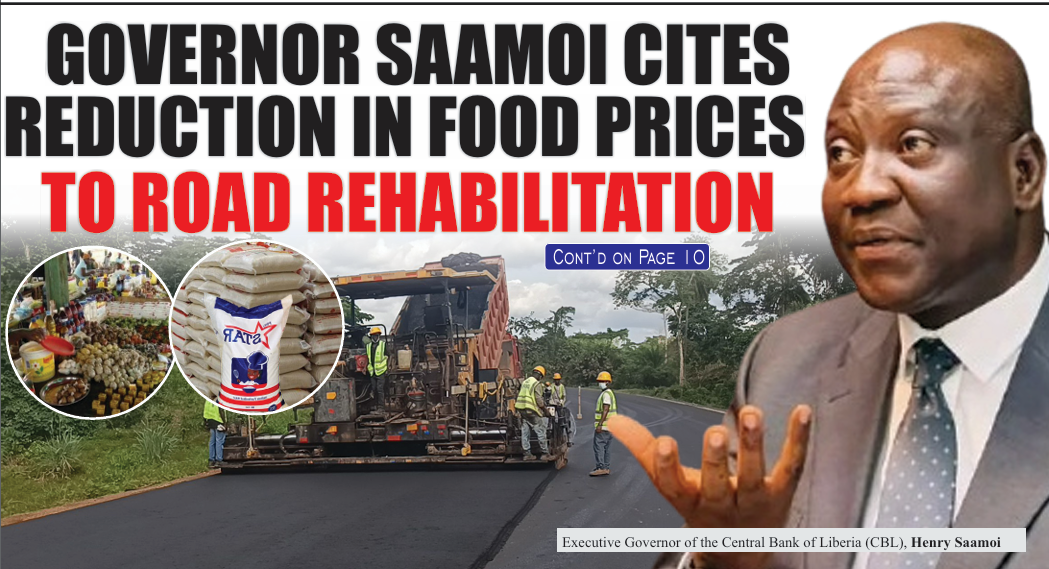Governor Saamoi Cites Reduction in Food Prices to Road Rehabilitation

The Executive Governor of the Central Bank of Liberia (CBL), Henry Saamoi, has announced a significant reduction in domestic food prices, attributing the encouraging development to the ongoing road rehabilitation initiatives under the administration of President Joseph Nyuma Boakai. Governor Saamoi made the remarks on Wednesday during the official reading of the Monetary Policy Communiqué for the second quarter of 2025 at the Bank’s headquarters in Monrovia. “We have noticed a decrease in domestic food prices,” Governor Saamoi stated. “The prices of local foods have reduced, and we must commend the central government’s efforts in road connectivity. This has made a measurable impact on food price dynamics across the country.” According to the Governor, Liberia’s food supply chain is increasingly benefiting from the government’s infrastructure drive, especially road rehabilitation projects aimed at improving access to remote agricultural communities. He stressed that the improved road conditions are enabling farmers to transport their produce to urban market centers faster and more efficiently, thereby reducing post-harvest losses and lowering transportation costs. “When farmers are able to deliver their goods on time and in good condition, this creates positive competition in the marketplace. It leads to greater supply, better price stability, and in this case, price reduction—particularly in local staples,” he explained. Governor Saamoi highlighted that this boost in logistical efficiency is not just anecdotal but is being directly captured in economic indicators, especially those relating to inflation. “As a result of this, we saw an improvement in the inflation rate,” he revealed. “Inflation, which stood at 12.5 percent, dropped to 11.1 percent in the last quarter, and according to recent assessments by our team, it has further declined to 9.9 percent as of June 2025.” He noted that the trend is promising for the country’s macroeconomic outlook and reflects the early impact of targeted development policies under the government’s ARREST Agenda—which prioritizes Agriculture, Roads, Rule of Law, Education, Sanitation, and Tourism as drivers of inclusive growth. The Governor emphasized that the Central Bank will continue to monitor economic trends closely and align its monetary policy framework to support price stability, exchange rate moderation, and financial sector resilience. He expressed optimism that continued investment in infrastructure and agriculture will further consolidate these gains, especially in reducing the cost of living for ordinary Liberians. “Infrastructure development, particularly roads, is not just a public works achievement—it is a macroeconomic tool that influences supply chains, business productivity, and household welfare,” he asserted. Governor Saamoi also mentioned that the CBL is working in tandem with other arms of government and development partners to ensure that the benefits of macroeconomic gains are felt at the community level. He encouraged continued inter-agency collaboration to further reduce inflationary pressures and sustain economic growth. He added that beyond food price reduction, the improved market access is beginning to stimulate rural economies and create more opportunities for smallholder farmers, transporters, and traders. “Through these ongoing road rehabilitation projects, we are not only ensuring that goods reach the market but also that rural communities are integrated into the national economy. This aligns perfectly with the government’s broader vision of economic empowerment and poverty reduction,” he added. As Liberia continues to experience modest but steady growth, the Central Bank reaffirmed its commitment to fostering a stable macroeconomic environment through prudent monetary policy actions and the promotion of inclusive finance. The CBL’s second quarter report further noted improvements in the performance of the Liberian dollar, growing investor confidence, and increased remittance inflows—all of which contribute to a more stable economy. Governor Saamoi concluded his remarks by calling on all Liberians to support the government’s infrastructure initiatives, recognizing that better roads, efficient logistics, and stronger market linkages are fundamental to building a resilient and self-reliant economy. “The journey to economic recovery and transformation is gradual, but these early signs show we are on the right path. Let us stay focused, united, and committed to national development,” he said.


